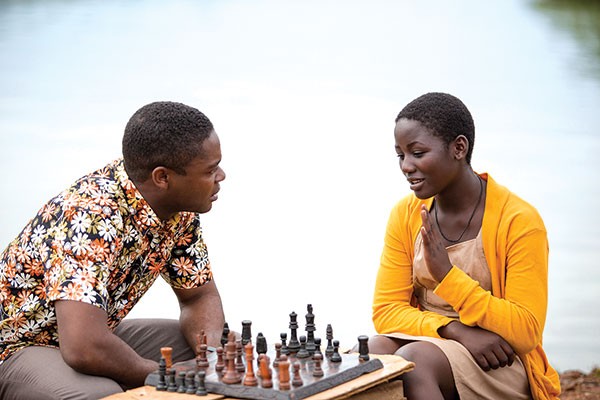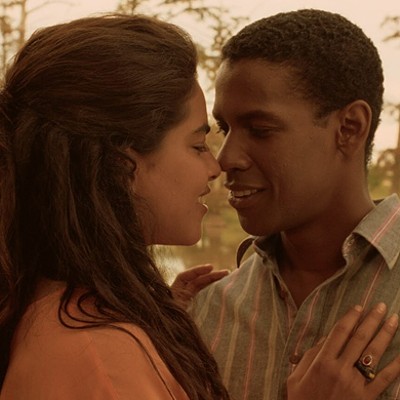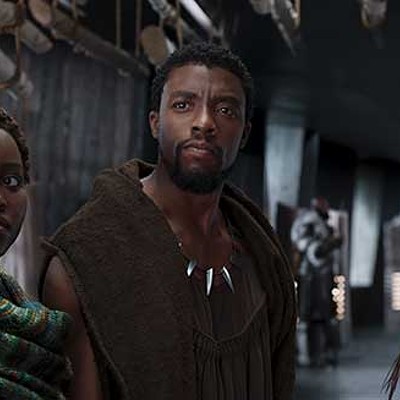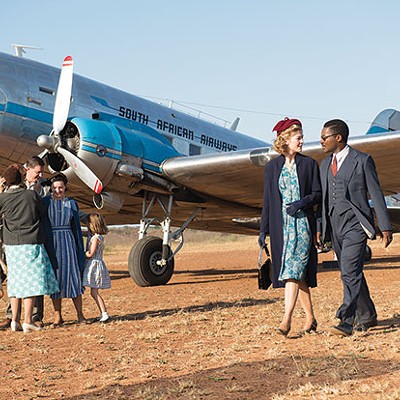Queen of Katwe
Mira Nair’s inspirational story of a young Ugandan chess champion triumphs over its formulaic parts

A successful match: chess coach Robert Katende (David Oyelowo) and his teen prodigy Phiona Mutesi (Madina Nalwanga)
Queen of Katwe
Directed by Mira Nair
Stars Madina Nalwanga, David Oyelowo, Lupita Nyong’o
Starts Fri., Sept. 30


Queen of Katwe, directed by Mira Nair, is a family-friendly film from Disney that tells the real-life story of Phiona Mutesi, a teenage chess champion from Uganda. The illiterate Phiona (Madina Nalwanga) lives in the Katwe slum of Kampala, whose modern high-rises are visible beyond the shacks. She is introduced to chess by Robert Katende (David Oyelowo), who runs a chess club in a shed, imparting game and life skills to his raggedy young charges; he also convinces Phiona’s struggling single mother, Harriet (Lupita Nyong’o), to let her compete in matches.
Nair’s film follows the formula of other inspirational tales, even adapting the “underdog sports” track: Victories are staggered with expected adversities (family, housing and money troubles). The three leads give low-key performances, which helps Queen feel more like an ensemble film, as befits the material; it really does take a village. The nonprofessional child actors toggle between wonderful and self-conscious, but the enthusiasm of these youngsters is infectious. Much of the dialogue is on-the-nose, but I’m hoping people will bring kids to see this, so one can forgive lines like “In chess, the small one can become the big one” and “You must never surrender.”
Honestly, there are so few movies about young women of color who succeed using brainpower that I’m OK with glossing over the film’s imperfect patches. (Also unusual for the genre: This film has no white savior.) It’s important to be reminded that not all triumphs — and not all supportive teams — are in sports. Celebrating and nurturing intelligence surely is a better long-term takeaway than recounting that one game-winning touchdown.
The story fares better when it explores the personal roadblocks Phiona faces — her insecurity and adolescent impulsiveness — and the psychic challenges of confronting another, more comfortable world beyond Katwe’s poverty. Her mother worries that such exposure will leave Phiona “not here, and not there,” condemned to float between them “like a ghost who cannot rest.” Such fears are warranted, even as the protagonists’ goals are modest by our standards: Can being good at chess get these kids into schools? The film may present chess as another sport to be conquered, but what’s on the line is a life-changing opportunity, not a trophy.
I’m not a huge fan of “inspired by” stories; their formulaic nature numbs me. But I do love the scene during these films’ credits when we see the real people, in photos or archival footage, which offers the satisfying zing of things as they actually were, free from Hollywood gloss and spin. True to form, Queen had a charming credits sequence, where the actual young chess players of Katwe pose goofily with the actors who portrayed them. Real people are the best.
Nair’s film follows the formula of other inspirational tales, even adapting the “underdog sports” track: Victories are staggered with expected adversities (family, housing and money troubles). The three leads give low-key performances, which helps Queen feel more like an ensemble film, as befits the material; it really does take a village. The nonprofessional child actors toggle between wonderful and self-conscious, but the enthusiasm of these youngsters is infectious. Much of the dialogue is on-the-nose, but I’m hoping people will bring kids to see this, so one can forgive lines like “In chess, the small one can become the big one” and “You must never surrender.”
Honestly, there are so few movies about young women of color who succeed using brainpower that I’m OK with glossing over the film’s imperfect patches. (Also unusual for the genre: This film has no white savior.) It’s important to be reminded that not all triumphs — and not all supportive teams — are in sports. Celebrating and nurturing intelligence surely is a better long-term takeaway than recounting that one game-winning touchdown.
The story fares better when it explores the personal roadblocks Phiona faces — her insecurity and adolescent impulsiveness — and the psychic challenges of confronting another, more comfortable world beyond Katwe’s poverty. Her mother worries that such exposure will leave Phiona “not here, and not there,” condemned to float between them “like a ghost who cannot rest.” Such fears are warranted, even as the protagonists’ goals are modest by our standards: Can being good at chess get these kids into schools? The film may present chess as another sport to be conquered, but what’s on the line is a life-changing opportunity, not a trophy.
I’m not a huge fan of “inspired by” stories; their formulaic nature numbs me. But I do love the scene during these films’ credits when we see the real people, in photos or archival footage, which offers the satisfying zing of things as they actually were, free from Hollywood gloss and spin. True to form, Queen had a charming credits sequence, where the actual young chess players of Katwe pose goofily with the actors who portrayed them. Real people are the best.

















